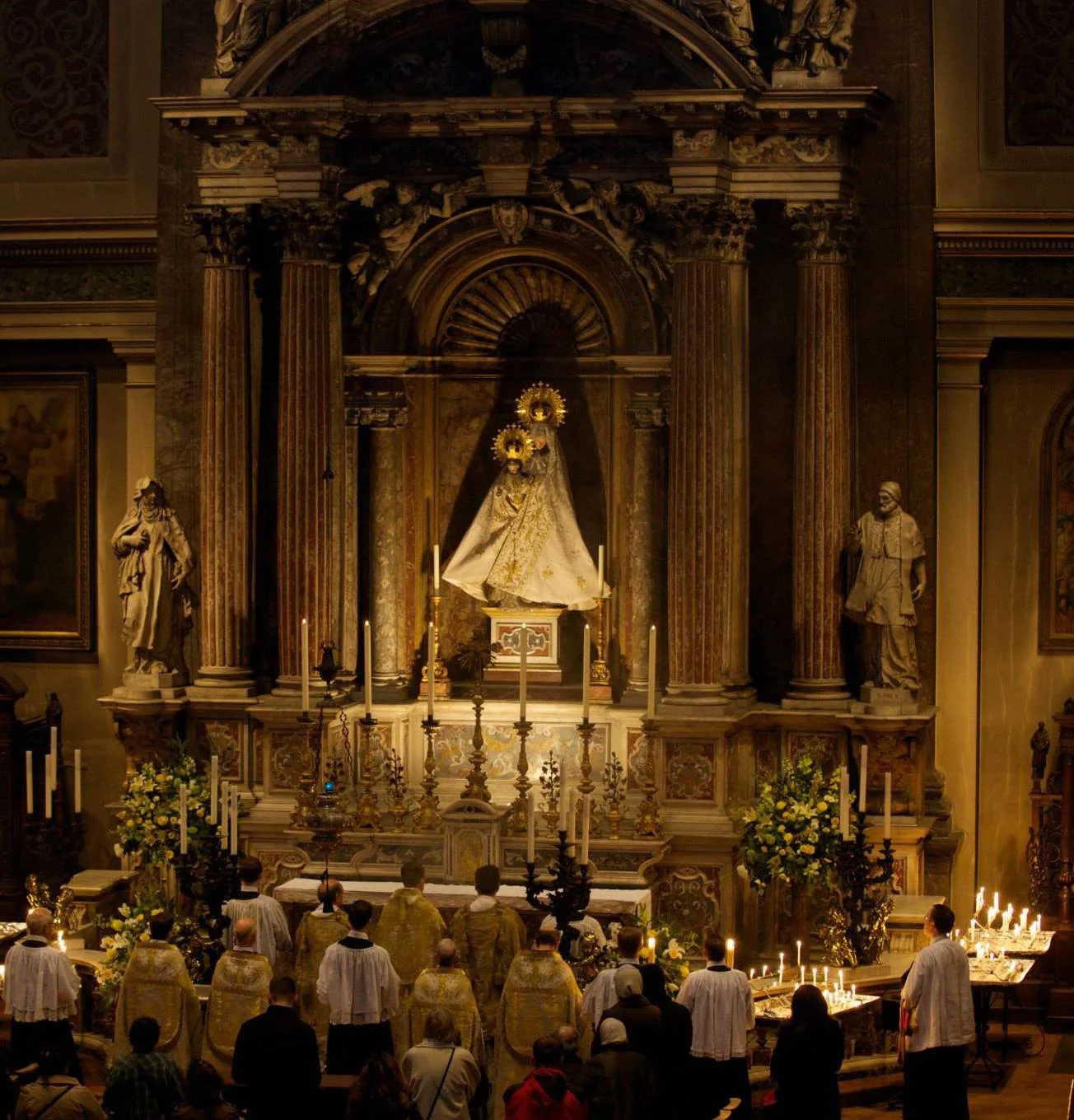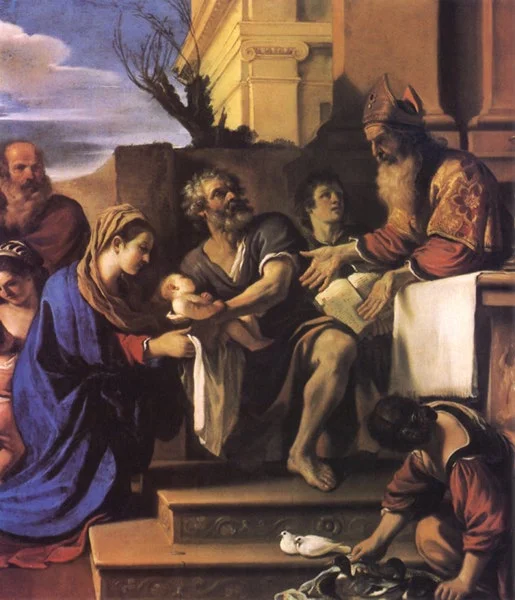A senior Catholic prelate attending an Evangelical conference in London not long ago was asked to give testimony to his Faith and to talk about his vocation to the priesthood. He recounted how when he was a child his family would go on holiday to resorts along the northern coast of Wales (no doubt to the same beaches which would later be excavated by the Provost’s bucket and spade on summer excursions when he was still in short pants and red plastic sandals). The first thing the prelate-to-be’s mother did after dropping the luggage off at the hotel was to search the town for the local Catholic church. Once that location had been established, and a visit made to Our Lord in the Blessed Sacrament and Mass times noted, then the business of paddling in the chilly Irish Sea and climbing Llandudno’s Great Orme could begin in earnest. But the local Catholic church, and the Presence of Our Lord Jesus there in the Tabernacle and in the offering of Holy Mass, always remained at the heart of the holiday. The determination and quiet devotion of that Catholic mother tilled and fertilised the ground in which the seeds of a priestly vocation, planted in her son’s heart, would eventually germinate into a life of service to the Kingdom of God on earth.
We are now at the height of the holiday season, when many of our parishioners leave London in search of relaxation, to be replaced in the pews by visitors from far and wide who often enter the Oratory church shaking the rain off umbrellas borrowed from local hotels. The Church encourages leisure, and in Her instructions regarding obligatory Mass attendance She actually enjoins us, on the prescribed days, to shun work that prevents us from worshipping God and also to avoid activities that hinder relaxation of mind and body. Those with the resources that allow them to go away on holiday should thank God for this opportunity of refreshment and restoration, and give a thought for those who are not so blessed.
Tourists holidaying in London never have far to go in order to find Catholic churches in which to fulfil their Sunday obligation. Those of us travelling further afield have to organise ourselves more carefully to ensure that we are able to fulfil ours. However, the communications miracle that has taken place in recent years means that it is usually quite easy to track down churches through judicious use of search engines on the Internet. Google ‘Kuala Lumpur’ and ‘Mass times’ together and quite a few options are bound to appear.
The obligation to attend Holy Mass on Sundays and Holy Days of Obligation is a precept which is rooted in the Third Commandment to keep the Sabbath day holy. Catholics are bound to obey this precept “on pain of mortal sin”, which means that if we miss Mass without grave cause we may not receive Holy Communion again until we have been given absolution in the Sacrament of Penance. Current discipline also allows Catholics to fulfil their Sunday obligation by attending any Catholic Mass (liturgically it does not have to be the Mass ‘of the Sunday’ – it might, for example, be a nuptial Mass at a Catholic wedding) on a Saturday evening. Grave causes which exempt us from the obligation include illness, childcare, looking after the sick and necessary travel. Also, if we find ourselves in the depths of the wilderness far from a Catholic church and with no reasonably attainable means of reaching one, then no obligation applies.
Different authorities are likely to provide varying interpretations of what constitutes ‘necessary travel’ on a Sunday or a Holy Day of Obligation. The fathers of the London Oratory are famed throughout Christendom and beyond for their cheerful dispositions and lightness of touch, ever careful as they are never to break a bruised reed or to extinguish any dimly burning wick. And so it is likely that we would take as lenient an approach as conscience allows with anyone confessing to having missed Sunday Mass because they were travelling to a holiday destination. Threats of everlasting hellfire are not something to be brandished lightly.
Rather than weighing up whether our travel plans let us off the hook as far as Mass attendance is concerned, however, we should better reflect on what the Holy Mass really means to us, and on how central this unique and priceless treasure of our Catholic religion is to our lives. Since the earliest days of our Faith the Sacrifice of Calvary, presented anew at every celebration of Mass, has been the foundation and the heart of Christian worship, especially on Sunday, the ‘day of the Lord’, which has been forever hallowed by Our Lord’s Resurrection and as the day when the whole Mystical Body of Christ has always gathered together in visible unity to give thanks and praise as He comes to the Altar to make satisfaction for sins and to feed us with His Living Body.
The price of the Holy Sacrifice of the Mass is Our Lord’s own Precious Blood, poured out for sinners in an action of pure and perfect love. In times of persecution, Christians have risked life and limb to make themselves present at this Sacrifice (quite literally in the case of those English martyrs who were brutally dismembered while still alive for celebrating, or facilitating the celebration of, Mass). These heroes of our Faith did not quibble about whether the perilous circumstances in which they lived absolved them from an ‘obligation’ to go to Mass. They sacrificed their safety, their livelihoods and sometimes life itself for the privilege and the joy of attending Holy Mass. The English Martyrs would have rejoiced to know that one day their fellow countrymen would be able to attend Mass again freely, and we can be confident that they implore us now from Heaven never to take this greatest of blessings for granted.
The truth is that, in this life, our love for Jesus and our love for the Mass are really inseparable. It is in the Mass that His Sacrifice of love is made present to us just as truly as it was present to Our Lady and St John as they wept at the foot of the Cross in Jerusalem two thousand years ago. It is at Holy Communion that we encounter Him and receive His living, risen Body, giving us a union with Him which is more profound and perfect than any union we could ever experience with any other person whose love we cherish. If our friends happen to notice that we are willing to go to great efforts to attend Mass, even at considerable inconvenience to ourselves, then this is surely an effective witness to what should be the most precious and beautiful gift in our lives as Catholics.
When reflecting on the importance of the Mass in our lives, it might help to consider an analogy. Imagine a newly married couple, whose circumstances in life mean that, for the time being, they are only able to meet and spend time together at weekends. After a while, even those weekly meetings begin to be interrupted by sports events, and social engagements which they make independently of each other, so that the occasions spent in each other’s company become fewer and further between. Once this situation has arisen, it is a sure sign that there is something seriously amiss in that marriage – something that needs to be addressed quite urgently. If we find that our attendance at Holy Mass is becoming an afterthought in our lives rather than a priority, then this is a sure sign that something needs to be addressed in our relationship with God.
When we are making our travel plans for this summer, perhaps we should ask ourselves: do we really need to travel on a Sunday, and do we really want to go somewhere where there is no Catholic church and no opportunity to go to Mass? Think of the vocation that was nurtured in a young boy’s heart on the northern shores of Wales, all because of a mother’s devotion to Our Lord Jesus in the Blessed Sacrament, even on holiday.
Fr Julian Large










